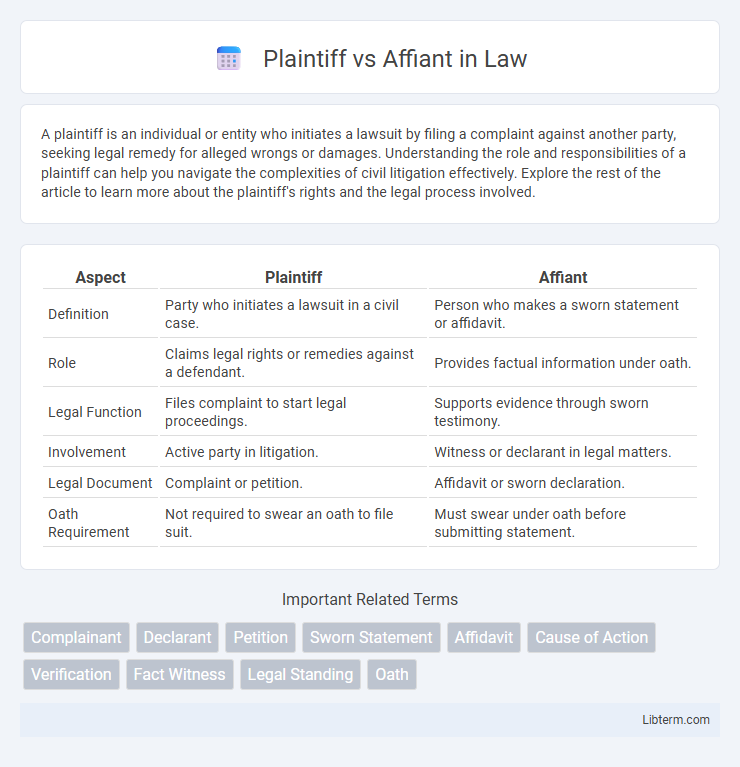A plaintiff is an individual or entity who initiates a lawsuit by filing a complaint against another party, seeking legal remedy for alleged wrongs or damages. Understanding the role and responsibilities of a plaintiff can help you navigate the complexities of civil litigation effectively. Explore the rest of the article to learn more about the plaintiff's rights and the legal process involved.
Table of Comparison
| Aspect | Plaintiff | Affiant |
|---|---|---|
| Definition | Party who initiates a lawsuit in a civil case. | Person who makes a sworn statement or affidavit. |
| Role | Claims legal rights or remedies against a defendant. | Provides factual information under oath. |
| Legal Function | Files complaint to start legal proceedings. | Supports evidence through sworn testimony. |
| Involvement | Active party in litigation. | Witness or declarant in legal matters. |
| Legal Document | Complaint or petition. | Affidavit or sworn declaration. |
| Oath Requirement | Not required to swear an oath to file suit. | Must swear under oath before submitting statement. |
Introduction to Plaintiff and Affiant
A plaintiff is an individual or entity who initiates a lawsuit by filing a complaint in a court of law seeking legal remedy for an alleged wrong. An affiant is a person who provides a sworn statement or affidavit, affirming the truthfulness of the information contained within the document. While the plaintiff drives the legal action, the affiant serves to support the case by offering credible, sworn testimony outside the courtroom.
Definition of Plaintiff
The plaintiff is the party who initiates a lawsuit by filing a complaint in a court of law, seeking legal remedy for an alleged wrong or injury. This entity holds the burden of proof to establish the facts supporting their claims in civil litigation. Unlike an affiant, who is a person providing a sworn statement or affidavit, the plaintiff actively pursues judicial resolution.
Definition of Affiant
An affiant is a person who provides a sworn statement or affidavit, affirming that the facts presented are true to the best of their knowledge. Unlike a plaintiff, who initiates a lawsuit seeking legal remedy, an affiant's role is to supply testimonial evidence crucial for legal proceedings. Affiants must sign the affidavit in the presence of an authorized official, such as a notary public, to validate the document's authenticity.
Legal Roles: Plaintiff vs Affiant
The plaintiff is the party who initiates a lawsuit by filing a complaint seeking legal remedy, holding the role of claimant in civil litigation. The affiant is an individual who provides a sworn statement or affidavit, serving as a declarant under oath to present factual evidence in legal proceedings. The plaintiff's role is to establish a cause of action, while the affiant's role is to offer verified testimony supporting or opposing claims within the case.
Key Differences Between Plaintiff and Affiant
A plaintiff is the party who initiates a lawsuit by filing a complaint in a court of law, seeking legal remedy or damages, whereas an affiant is an individual who provides a sworn written statement or affidavit used as evidence in legal proceedings. The plaintiff plays an active role in pursuing a claim, while the affiant's role is limited to verifying facts under oath. Understanding these distinctions is crucial for legal procedures involving litigation and evidentiary submissions.
Responsibilities in Legal Proceedings
The plaintiff holds the responsibility of initiating a lawsuit by filing a complaint and proving their claims based on evidence and legal grounds. The affiant, on the other hand, is responsible for providing a sworn written statement or affidavit that supports facts pertinent to the case, ensuring the information is truthful under oath. While the plaintiff drives the legal action, the affiant's role is critical in substantiating specific details vital to the court's understanding and decision-making process.
Examples of Plaintiff in Court Cases
A plaintiff is the party who initiates a lawsuit by filing a complaint against another party, seeking legal remedy for a grievance. Examples of plaintiffs include individuals suing for personal injury, businesses pursuing breach of contract claims, and government entities filing cases to enforce regulations. The plaintiff's role is to present evidence and argue the facts to prove the defendant's liability in court.
Examples of Affiant in Legal Documents
An affiant is a person who provides a sworn statement or affidavit as evidence in legal proceedings, such as a witness testifying under oath in a deposition or a party verifying the accuracy of a document. Examples of affiants in legal documents include witnesses attesting to the facts of a case, individuals swearing to the authenticity of signatures on contracts, or experts submitting sworn affidavits to support their opinions in court. Unlike a plaintiff, who initiates a lawsuit, an affiant's role is to provide verified information or attestations central to the case's evidence.
Importance of Accurate Identification
Accurate identification of the plaintiff and affiant is crucial in legal proceedings to ensure the validity and reliability of testimony and claims. Misidentification can lead to procedural errors, dismissal of cases, or wrongful judgments, undermining the integrity of the judicial process. Precise distinctions between these parties facilitate proper case management and uphold the standards of evidence in court.
Common Misconceptions and FAQs
Plaintiff refers to the party who initiates a lawsuit by filing a complaint, seeking a legal remedy, while an affiant is an individual who provides a sworn written statement or affidavit under oath but is not necessarily a party to the lawsuit. Common misconceptions include confusing an affiant with a plaintiff, assuming all affiants have initiated legal action, and believing an affiant's statement serves as direct evidence without corroboration. Frequently asked questions address whether an affiant must be a party to the case, the legal weight of an affidavit compared to testimony, and the role of affiants in civil versus criminal proceedings.
Plaintiff Infographic

 libterm.com
libterm.com